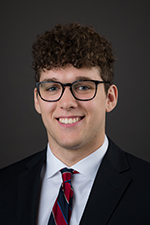Keeping the Engines Running
Sam Swain (MLDS ‘23) looks back on his summer internship with United Airlines and creating machine learning models that better predict when a key component that keeps aircraft flying might fail.
Keeping a 500,000-lb., $239 million aircraft in the air filled with more than 240 travelers sometimes comes down to a small piece of machinery.
That machinery grew to be Sam Swain’s summer obsession.
 Swain (MLDS '23) is a student in Northwestern Engineering's Master of Science in Machine Learning and Data Science (MLDS) program (formerly the MSiA program). This summer, he interned as a data scientist with United Airlines, developing a model to help better predict when a specific part of the Boeing 787’s engines might fail.
Swain (MLDS '23) is a student in Northwestern Engineering's Master of Science in Machine Learning and Data Science (MLDS) program (formerly the MSiA program). This summer, he interned as a data scientist with United Airlines, developing a model to help better predict when a specific part of the Boeing 787’s engines might fail.
“I've always been deeply engrossed in problem-solving scenarios that require the use of machine learning and deep learning techniques,” Swain said. “The aspect of this opportunity that most excited me was the prospect of creating ones designed to predict aircraft component failures.”
The particular component Swain focused on is called the Variable Frequency Starter Generator (VFSG). It assists in the startup of the 787’s two massive main engines and then acts as a generator to keep them running while in flight.
Failure of this component leads to costly downtime for repairs, while proactive predictions in advance of a failure lower expenses and, more importantly, increase passenger safety.
“The predictive models we're developing could potentially save United hundreds of thousands, if not millions of dollars,” Swain said. “This pivotal work ensures the safety and efficiency of our operations, reducing unplanned maintenance downtime, and enhancing customer satisfaction.”
Swain’s work involved a lot of coding to create an accurate, dependable data flow from the VFSG into what is becoming the predictive models. The more data, the more quickly the machine learning happens.
But data itself doesn’t drive action, Swain realized this summer. Another key part of his internship was taking the data and presenting it in an easily understood and visually appealing narrative that enabled United personnel to make important decisions on when to preemptively replace VFSGs.
Swain said he felt well prepared to tackle the challenges he faced this summer.
“The lessons I've learned during my studies in the MLDS program were indispensable in my internship at United, seamlessly translating into real-world applications,” he said. “The extensive training in building and tuning machine learning and deep learning models was instrumental in my projects.”
The internship itself added to Swain’s skill set, giving him a deeper knowledge base to tackle the rest of his MLDS education. Just like the VFSG is critical to the 787's engine, Swain realized the required summer internship is a key component of the MLDS program.
“The internship component of the MLDS program is a quintessential aspect of the educational experience, particularly for aspiring data scientists at the outset of their careers,” he said. “Once you begin working in the field, the flexibility and adaptability fostered by the program come into play.”
Because of that, Swain strongly recommends the MLDS program to prospective students.
“The hands-on experience ensures that students are well-aligned with current industry needs and standards,” he said. “By working on real projects, they become attuned to the demands and expectations of the modern data science industry, better equipping them for successful careers.”

